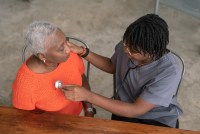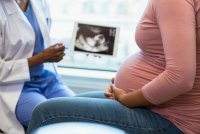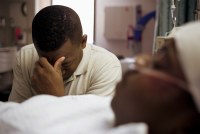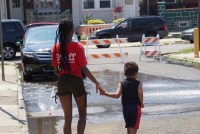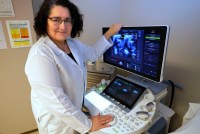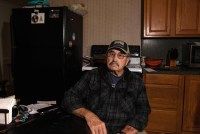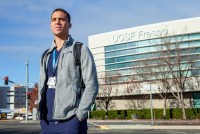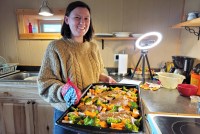Latest KFF Health News Stories
Cardiovascular Disease Is Primed to Kill More Older Adults, Especially Blacks and Hispanics
Cardiovascular disease is the biggest killer of older Americans, with Black and Hispanic people at higher risk. Despite medical advances, researchers say, disparities are expected to worsen in the coming decades.
Mammograms at 40? Breast Cancer Screening Guidelines Spark Fresh Debate
There is no direct evidence that screening women in their 40s will save lives, yet modeling suggests expanding routine mammography to include them might avert 1.3 deaths per 1,000. Highlighting the risk of false positives, some specialists call for a more personalized approach.
La enfermedad cardiovascular podría matar a más adultos mayores hispanos
El dramático envejecimiento de la población de Estados Unidos y el número creciente de personas con afecciones como hipertensión, diabetes y obesidad —que aumentan el riesgo cardíaco— se espera que contribuyan a este escenario alarmante.
¿Mamografías a los 40? Nueva pauta para la detección del cáncer de seno genera debate
Algunos médicos e investigadores que están interesados en un enfoque más individualizado para encontrar tumores problemáticos se muestran escépticos y plantean preguntas sobre los datos y el razonamiento detrás del cambio radical del Grupo de Trabajo de Servicios Preventivos de Estados Unidos
California’s Fentanyl Problem Is Getting Worse
State lawmakers have recently been debating whether and how to stiffen punishments for dealers, while Gov. Gavin Newsom is targeting fentanyl trafficking and distributing more naloxone. The problem, experts say, is one with no easy or clear answers.
Se agrava la crisis del fentanilo en California
Impulsadas en gran medida por la prevalencia del fentanilo, un opioide sintético hasta 100 veces más potente que la morfina, las sobredosis de drogas en California matan ahora a más del doble de personas que los accidentes de tráfico.
A Striking Gap Between Deaths of Black and White Babies Plagues the South
Infant mortality rates across the South are by far the worst in the U.S. A look at South Carolina — where multimillion-dollar programs aimed at improving rates over the past 10 years have failed to move the needle — drives home the challenge of finding solutions, especially in rural communities.
Study Reveals Staggering Toll of Being Black in America: 1.6M Excess Deaths Over 22 Years
The profound and painful loss — 80 million years of life, compared with the white population — is a call to action to improve the health of Black Americans, especially infants, mothers, and seniors, researchers say.
El trabajo en Chicago, Philadelphia, Los Ángeles y Nueva York halló que los niños negros no hispanos tenían 100 veces más probabilidades que los blancos no hispanos de ser víctimas de tiroteos mortales y no mortales.
Gun Assault Rates Doubled for Children in 4 Major Cities During the Pandemic, New Data Shows
A study of roughly 2,700 shootings in Chicago, Los Angeles, New York, and Philadelphia found that racial disparities in gun injuries and deaths widened during the covid-19 pandemic. Researchers looked only at assaults, excluding accidents or incidents of self-harm.
The Nation’s Health Secretary Has This Doctor on Call
Carolina Reyes, a physician who specializes in high-risk pregnancies, says providers and health systems have a role in tackling systemic racism. She’s also married to U.S. Health and Human Services Secretary Xavier Becerra.
As US Life Expectancy Falls, Experts Cite the Health Impacts of Incarceration
In a nation with one of the highest incarceration rates in the world, imprisonment speeds the aging process, research shows. Some experts complain the federal government isn’t collecting or releasing data that could identify disease patterns and prevent deaths.
How One Patient’s Textured Hair Nearly Kept Her From a Needed EEG
An EEG can help diagnose conditions like epilepsy, sleep disorders, and brain tumors. But a design flaw and outdated Eurocentric practices make the test less effective on thicker, denser, and curly hair types, potentially excluding or deterring some people from getting screened.
Programa forma médicos multiculturales, pero no siempre ejercen en áreas vulnerables
Investigadores han descubierto que el programa ha logrado diversificar la inscripción, pero no hay suficiente seguimiento a largo plazo para saber si estos graduados ejercen en las regiones donde más se necesitan.
A California Physician Training Program Adds Diversity, but Where Do Graduates End Up?
Researchers found that, while a University of California medical training program has diversified the system’s pool of medical students, there’s not enough long-term data to know whether graduates return to practice where they’re needed most.
Fresh Produce Is an Increasingly Popular Prescription for Chronically Ill Patients
Fresh produce prescription programs are getting a boost in Montana as a way of helping people with chronic conditions such as diabetes and high blood pressure. The approach may be a model for other rural states to promote healthy eating in food deserts.
Estados Unidos sigue siendo uno de los países con más partos prematuros. ¿Se puede solucionar?
Aproximadamente uno de cada 10 nacimientos vivos en 2021 ocurrió antes de las 37 semanas de gestación, según un informe de March of Dimes publicado en 2022. En comparación, investigaciones recientes citan tasas de nacimientos prematuros del 7,4% en Inglaterra y Gales, del 6% en Francia y del 5,8% en Suecia.
The US Remains a Grim Leader in Preterm Births. Why? And Can We Fix It?
American women are more likely to deliver their babies prematurely than women in most developed countries. It’s a distinction that coincides with high rates of maternal and infant death, billions of dollars in costs, and even lifelong disabilities for the children who survive.
Estrés pandémico, pandillas y miedo impulsaron un aumento de tiroteos adolescentes
Investigaciones muestran que los adolescentes expuestos a la violencia armada tienen el doble de probabilidades que otros de cometer un delito violento grave dentro de los dos años luego del trauma, lo que perpetúa un ciclo difícil de romper.
Pandemic Stress, Gangs, and Utter Fear Fueled a Rise in Teen Shootings
With their brains still developing and poor impulse control, teens who carry firearms might never plan to use them. But some do.



